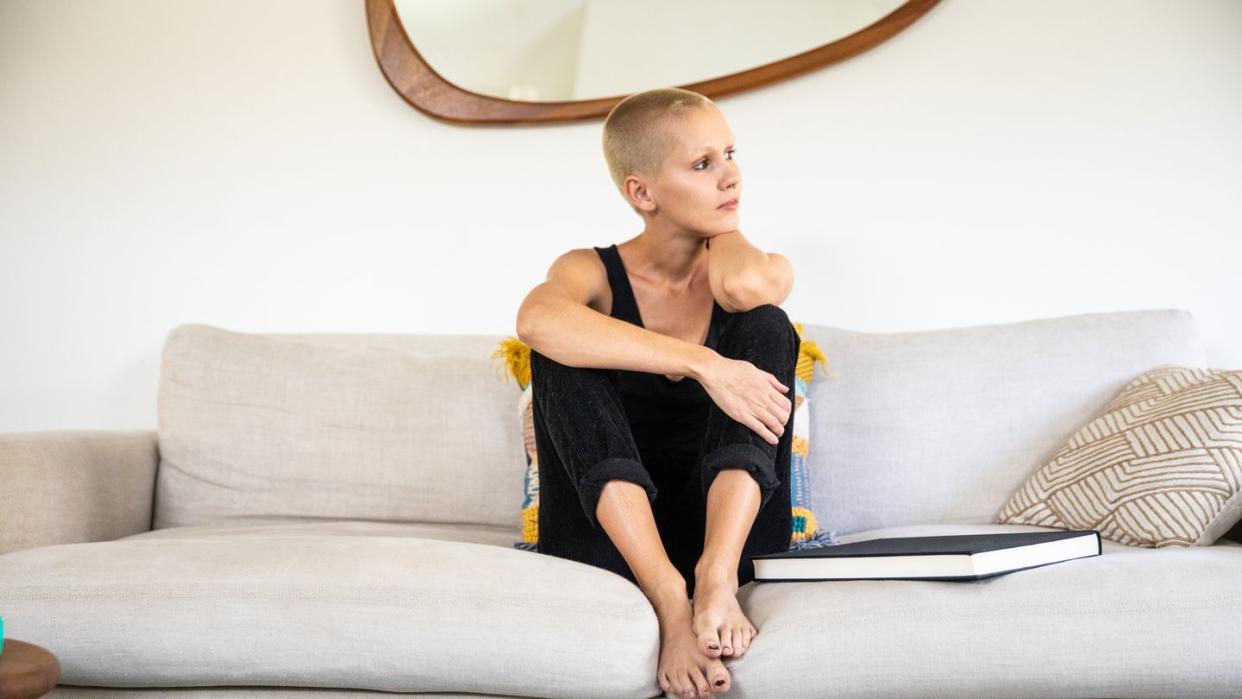Why Is the Recurrence of Early Breast Cancer in the Double Digits?

"Hearst Magazines and Yahoo may earn commission or revenue on some items through these links."
Get this: Women with early breast cancer (cancer that has not spread beyond the breast or underarm lymph nodes) have approximately a 10 percent chance of having their disease recur within five years of treatment. What’s more, 15 percent of these patients will see their breast cancer return within 10 years of treatment.
Those numbers seem scary, but despite the double digits, early-breast-cancer recurrence is considered rare, and those numbers are at the upper ranges. There are a host of factors that explain them, and many ways to make them lower. Let’s find out what those are.
Factors that can determine whether breast cancer returns
Diagnosis age
“Although breast-cancer treatments continue to get better overall, and recurrence rates for certain types of breast cancer are actually improved compared to prior decades, recent data shows people are now being diagnosed at younger ages,” says Dr. Anne Peled, a breast-cancer surgeon and co-director of the Sutter Health California Pacific Medical Center Breast Cancer Program, in San Francisco. “This means that many people are being diagnosed with more advanced breast cancers, since younger patients are typically diagnosed through breast lumps or other symptoms. Older patients, on the other hand, are often diagnosed through screening mammograms, which detect breast cancers that are small and asymptomatic.”
Recurrence risk
“The risk of breast cancer is very individualized, and depends on many factors,” says Dr. Eleonora Teplinsky, clinical assistant professor of medicine at Icahn School of Medicine at Mount Sinai in New York City. “These factors include, but are not limited to, tumor size, lymph-node status, grade, breast-cancer hormone receptor status, treatment received, and response to treatment.”
Additionally, the type of cancer a woman has affects when it might come back. “For example, the risk of recurrence for a triple-negative breast cancer is greatest in the first five years after diagnosis,” Dr. Teplinsky says. “The risk of recurrence for a hormone-receptor-positive breast cancer persists for a longer period of time. Still, while triple-negative breast cancer and inflammatory breast cancer are at greatest risk of recurrence, it truly depends on all of a patient’s individual factors.”
Specific diagnostic qualities can also increase a woman’s odds. It’s important to keep in mind that women with early-stage breast cancer are not as likely to have the cancer come back as patients with more advanced disease are. Back to the kind of tumor you may have had: “Patients who have larger tumors, or tumors that have spread to lymph nodes, are more likely to have recurrences than those with earlier-stage tumors,” says Dr. Peled.
Treatment plan
OK, time to take a deep breath. The good news here: You can work with your doctor to catch any new problems early and make good treatment decisions.
For instance, a lumpectomy, when just the lump is removed, has the highest chance of recurrence, and it tends to happen within five years. But when radiation is added to this course of treatment, the rate of recurrence is lowered to 3 to 15 percent within 10 years of treatment. And a mastectomy has the same recurrence rate as the combination therapy. A treatment plan that uses a combination of therapies could help lower your chance of recurrence—so this should be something that women speak to their oncologists and breast-cancer surgeons about.
All this is great to know... but how quickly can breast cancer come back?
As little time as three years, according to a recent study out of the University of North Carolina at Chapel Hill. And it’s very important that a woman with a breast-cancer recurrence be diagnosed as soon as possible—especially because when breast cancer returns, it is often deemed incurable, having metastasized (spread to other areas of the body, such as the bones) by the time the recurrence has been diagnosed.
So if you have had early breast cancer, monitor your body as instructed by your doctor, and bring any changes you note in your breasts, or in your health in general, to their attention immediately. In addition, keep follow-up screening and testing schedules.
Can you prevent breast cancer from coming back?
No, but there are ways to shore up your body and reduce the percentages. Your first step: Talk to your doctor about how concerned you personally need to be about a recurrence. “I encourage all patients with a history of breast cancer to discuss their individual recurrence risk with their medical team,” says Dr. Teplinsky. If they determine your odds of a recurrence are high, they may recommend specific drug therapies as a safety measure. “Advances over the last several years that are helping to reduce the risk of recurrence include treatments such as immunotherapy and CDK 4/6 inhibitors,” she adds.
You can also make simple changes to get healthier overall as a pre-emptive step. “We can reduce the risk of recurrent breast cancer through lifestyle modifications,” says Dr. Teplinsky. “Recommendations include limiting alcohol use, limiting consumption of processed meat and red meat, eating more plants, and staying physically active.” Maintaining a healthy weight can also decrease recurrence rates, Dr. Peled points out. In other words, basically the same lifestyle modifications recommended to reduce the risk of getting cancer in the first place.
The bottom line: Recurrence of early breast cancer is indeed a thing, and it’s important to stay aware of your risk factors and any signs your body gives you. At the same time, know this: If you’re a breast-cancer survivor, you’ve already proven you possess amazing strength, both physically and mentally. So keep everything in perspective, think positive, and live your life to the fullest—as you so deserve to do!
You Might Also Like
